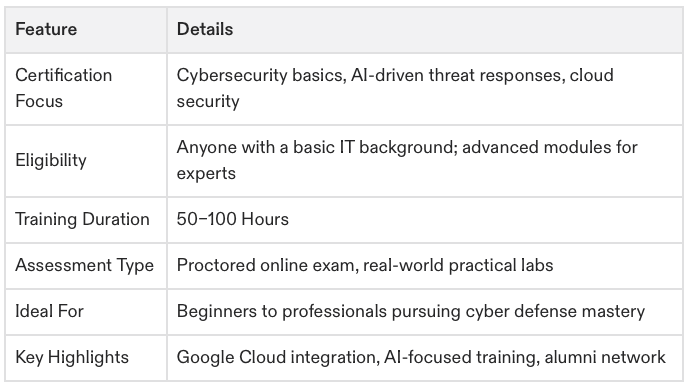Table of Contents
The growing reliance on digital systems has made cybersecurity a top priority for organizations worldwide. With cyberattacks growing in sophistication, skilled cybersecurity professionals have never been in higher demand. Navigating this field can be challenging, but earning the best cybersecurity certification can be your ticket to thriving in this competitive, lucrative industry.
This ultimate guide breaks down the certifications that bring the most value in 2025. We’ll explore their career impacts, associated salaries, and how they prepare you for real-world challenges. Stick around to learn about an innovative ACSMI certification course offering 400+ modules tailored to future-proof your cybersecurity expertise.
Why Cybersecurity Certifications Are Essential
Cybersecurity threats are evolving, and organizations need specialists to secure systems, networks, and data. Certifications act as benchmarks of your skills, making you stand out to employers. They signal to hiring managers that you possess verified knowledge, practical expertise, and a commitment to staying up-to-date with industry standards.
Certified professionals often land higher-paying roles, including specialized positions like cybersecurity analyst, ethical hacker, cloud security expert, and chief security officers. The right certification opens doors to many opportunities, often accelerating your career progression.
The Best Cybersecurity Certification Options for 2025
Choosing the best cybersecurity certification depends on your current skills, career goals, and the industry you want to specialize in. Below is a comprehensive breakdown of the leading certifications, including their relevance, costs, anticipated career paths, and salary impacts.
1. Certified Information Systems Security Professional (CISSP)
Target Audience: Senior-level professionals pursuing leadership roles
- Overview: The CISSP is a globally recognized certification for individuals who design, implement, and oversee cybersecurity programs.
- Exam Fee: $749
- Prerequisites: Five years of work experience in at least two of the eight CISSP domains (e.g., asset security, risk management, or security operations).
- Career Path: CISSP-certified professionals frequently advance into senior roles such as IT Security Manager, Security Architect, or Chief Information Security Officer (CISO).
- Potential Salary: CISSP holders earn an average of $120,000 annually, with salaries exceeding $150,000 for leadership roles.
- Real-World Impact: CISSP provides expertise in creating robust security postures, ensuring compliance, and safeguarding sensitive data against breaches.
2. Certified Ethical Hacker (CEH)
Target Audience: Those passionate about penetration testing and ethical hacking
- Overview: CEH focuses on analyzing vulnerabilities and conducting penetration tests to mitigate security risks.
- Exam Fee: $1,199
- Prerequisites: At least two years of IT industry experience is recommended but not mandatory.
- Career Path: Graduates typically work as Penetration Testers, Information Security Analysts, or Cybersecurity Consultants.
- Potential Salary: CEH-certified professionals command salaries ranging from $90,000 to $130,000 annually.
- Real-World Impact: Organizations rely on CEH experts to anticipate security threats by thinking like malicious hackers.
3. CompTIA Security+
Target Audience: Entry-level candidates looking for a strong foundation
- Overview: This vendor-neutral certification focuses on baseline cybersecurity skills and is often the first step in a cybersecurity career.
- Exam Fee: $392
- Prerequisites: None, though familiarity with IT networks and systems is helpful.
- Career Path: Ideal for roles such as IT Support Specialist, Junior Security Analyst, and SOC Analyst.
- Potential Salary: Professionals with this certification earn $65,000–$85,000, making it a valuable entry credential.
- Real-World Impact: Security+ ensures familiarity with risks, threats, mitigation strategies, and security best practices, making it a stepping stone for more advanced certifications.
4. Certified Cloud Security Professional (CCSP)
Target Audience: Specialists focusing on securing cloud-based environments
- Overview: The CCSP equips professionals with the skills to ensure data security in multi-cloud environments.
- Exam Fee: $599
- Prerequisites: Two years of IT experience, with a focus on cloud technologies.
- Career Path: Graduates commonly work as Cloud Security Engineers, Cloud Architects, or Security Analysts.
- Potential Salary: CCSP professionals earn $110,000 on average, reflecting the growing demand for secure cloud solutions.
- Real-World Impact: With businesses rapidly adopting hybrid and cloud infrastructures, CCSP holders lead efforts to combat cloud-specific threats, such as misconfigurations or unauthorized access.
5. Offensive Security Certified Professional (OSCP)
Target Audience: Highly skilled penetration testers and security consultants
- Overview: Known for its hands-on and rigorous approach, the OSCP focuses on real-world penetration testing skills.
- Exam Fee: $800–$1,499 (depending on the training package).
- Prerequisites: Strong knowledge of Linux, scripting, and networking is required.
- Career Path: Graduates frequently branch into roles like Pen Tester, Red Team Specialist, or Vulnerability Analyst.
- Potential Salary: OSCP professionals often make $100,000–$130,000, with advanced roles pushing salaries higher.
- Real-World Impact: The OSCP’s highly practical system arms professionals with tested hacking and defensive strategies under time-sensitive conditions.
Why Choose ACSMI's Advanced Cybersecurity Certification?
Standout Feature: An expansive curriculum with 400+ specialized modules designed to address the full spectrum of cybersecurity needs.
The ACSMI certification program offers a versatile, career-enhancing pathway for aspirants and seasoned professionals alike. With its strikingly comprehensive structure, it’s particularly aligned with emerging trends such as artificial intelligence in security, Zero Trust models, and advanced analytics.
Key Features of ACSMI Certification:
- Practical Application: Access hands-on labs and extensive real-world simulations to solidify your learning.
- 400+ Modules: Areas include Threat Hunting, Network Hardening, IoT Security, Blockchain Vulnerability Testing, and Digital Forensics.
- Flexibility for All Levels: Beginner courses cover essentials, while advanced modules include niche subjects like Quantum Encryption.
- Use in Industry: Modules align with current frameworks and certifications such as NIST, ISO 27001, and GDPR compliance requirements.
Here’s a detailed look at the ACSMI offering:

To explore how ACSMI offers the best cybersecurity certification, take a closer look at their structured, adaptive paths.
How to Select the Best Certification for Your Career
- Set Long-Term Goals: Want a leadership role? Choose advanced certifications like CISSP. Passionate about ethical hacking? CEH or OSCP is for you.
- Match Your Expertise: Beginners benefit from foundational certifications like CompTIA Security+, while experienced professionals can pursue specialized options.
- Identify Industry Needs: Focus on certifications valued in industries you want to work in, like healthcare or finance.
- Evaluate the ROI: Certifications can cost between $300–$1,500, but they often come with lucrative salary boosts of up to 30%.
Best Cybersecurity Certification
FAQs About Cybersecurity Certifications
1. Which is the best certification for beginners?
ACSMI is perfect for those starting their cybersecurity career. It is Counted as the best cybersecurity certification
2. What salary can ACSMI-certified professionals expect?
Salaries vary depending on specialization but range between $80,000 and $160,000 annually.
3. How long does it take to finish the ACSMI program?
The self-paced nature allows you to complete the certification in 6–12 months, depending on the chosen module density.
4. Can certifications replace experience in cybersecurity?
Certifications complement hands-on experience; they rarely substitute it. A mix of both is ideal for most roles.
5. What makes ACSMI certifications different?
Their inclusion of 400+ modules ensures broader knowledge coverage than most programs, equipping you to handle any field-specific risk with unmatched proficiency





